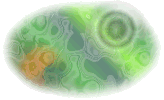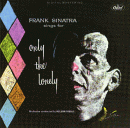|
Notes by Sammy Cahn and James Van Heusen, lyricist and composer of
the Academy Award winning song, All The Way, and of the title
song in this album.
Loneliness is many things to many people. For the keeper of the lighthouse
it is the loneliness that attends endless days and nights of watching
the angry sea. For the New York policeman on the dawn patrol it is the
measured loneliness of his beat to the accompaniment of the nocturnal
noises of the city.
For the lyricist and composer attempting to write a song of loneliness
for Frank Sinatra it becomes the challenge of matching words with notes.
Lonely words with equally lonely notes.
The Frank Sinatra that we know and have known (and hardly know) is an
artist with as many forms and patterns as can be found in a child's kaleidoscopticon.
Come Fly With Me is one Sinatra. All The Way is another
Sinatra. A Sinatra singing a hymn of loneliness could very well be the
real Sinatra.
What kind of a lonely song to write? The album itself would contain songs
like One For My Baby, What's New? and Blues In The Night,
the very best of the songwriter's art dedicated to the "Lost One,"
or as Frank likes to describe them, "The Losers." (This album
was nearly titled "For Losers Only," until it was decided that
this could well be mistaken for a collection of songs dedicated to the
gentlemen of the two-dollar window.)
First, then came the title, Only The Lonely. Then came the melody.
Van Heusen: "The lyric came very hard. Session after session without
the glimmer of a line. Sammy is as facile a man with words as there is
in our business, and I thought changing the melody here and there might
be helpful. He wouldn't permit me to change a note."
Cahn: "I believe this to be one of the best melodies Jimmy ever
composed. While I usually refuse to write a lyric that 'comes hard,' I'm
delighted now that the melody is exactly as I first heard it."
Here then, is Frank Sinatra in Only The Lonely. We have written
many songs for Frank, his reaction is never over-enthusiastic. It is always
the most imperceptible nod. We hope that you will give this album of songs
of loneliness the same imperceptible nod, because where Sinatra is concerned
we have come to know it means "It's a gasser!"
When the late Nelson Riddle, the distinguished arranger-conductor who
from the middle 1950s contributed so significantly to so many of the very
finest recordings Frank Sinatra ever made, was asked to name his own favorites
of the albums he made with the singer, he unhesitatingly cited this and
the Songs For Swingin' Lovers albums. The latter, which perhaps
best typifies the special easy-swinging way with ballad fare associated
with Sinatra and Riddle, was there second such collaboration along these
lines, the first being the aptly titled 10" LP of April 1954, Swing
Easy. And that, in turn, had been an outgrowth of their very first
album collaboration, Songs For Young Lovers, recorded in early
November of 1953.
As has become increasingly evident, these were important, even ground-breaking
albums, perhaps the very earliest to be organized along purely conceptual
lines. This alone would distinguish them from other album productions
of the period - which generally were little more than collections of hit
singles or other recent recordings by a performer - but what made these
Sinatra-Riddle collaborations so unusual and so successful, artistically
and commercially, at the time of their release, and what continues
to compel our interest and admiration even now, are the unprecedentedly,
extraordinarily high levels of focused artistry they consistently attained
in them, which place them among the very finest achievements in all of
American popular music. A number of them, in fact, are widely regarded
as classics, establishing the standards by which other such efforts are
to be judged. They've never been equaled, let alone eclipsed. This album
is such a one.
Recorded over three days in late May and early June of 1958, Only
The Lonely was little different than those album projects which had
preceded it. As they usually did, Sinatra, Riddle and Voyle Gilmore, the
singer's recording producer, had discussed the approach to be followed
in the album - that is, the overall emotional mood that would be projected
through its selection of songs and their settings - had gone through large
numbers of songs before a final selection had been made, the last word
in this area being the singer's, and Riddle set about writing the orchestrations.
Recording commenced on May 29, 1958, at which time six selections were
undertaken - Only The Lonely; Angel Eyes; Willow Weep For Me; Guess
I'll Hang My Tears Out To Dry; Ebb Tide; Spring Is Here. On the 24th
of the following month Sinatra and Riddle returned to Capitol's studios
to commit to record What's New?, Blues In The Night and Gone
With The Wind, and on the following day It's A Lonesome Old Town,
Good-Bye and One For My Baby (And One More For The Road).
Every one a standard of uncompromising excellence and, as you'll hear,
every one given a flawless performance by the singer and his arranger-conductor.
In the estimation of their writers, several of these readings are in fact
the songs' definitive ones. Even without their acknowledgement, this is
apparent solely on the evidence of one's ears. Rarely has one heard singing
of such power and persuasiveness, qualities made all the more so by the
direct, nonhistrionic character of the singing, which never once strains
after effect, never strikes a false or artificial note but which in its
unerring, compelling sincerity and forthrightness utterly and immediately
convinces. And so does Riddle's writing, never so right or emotionally
authentic as here, and never so perfectly, helpfully imaginative.
The late-night mood, wistful and melancholy, is immediately established
by the album's opener and title song, a particularly affecting lament
for love gone wrong that is notable for Sinatra's deeply moving, uncloying,
beautifully enunciated singing and Riddle's lovely, complimentary writing
for the string and woodwind orchestra. A deceptively upbeat quality is
introduced, briefly as it turns out, as Sinatra attacks the seldom-performed
verse to Matt Dennis' beautifully limned Angel Eyes, but the
mood of quiet desperation of the late-night toper reasserts itself as
soon as the singer starts the first familiar strain of the song. Riddle's
writing is particularly, subtly helpful in maintaining the doleful mood.
This performance, stunning as it undoubtedly is, is succeeded by what
is arguably the single finest, most powerful reading of the Haggart-Burke
composition What's New? ever recorded, Sinatra's slow, stately,
emotion-wrenching vocal framed by one of the most exquisite orchestrations
Riddle ever devised for the singer. Listen and marvel; this is perfection.
The introduction to the somber It's A Lonesome Old Town very
effectively offers a fugitive allusion to Angel Eyes' melodic
line before establishing its own tellingly powerful mood of almost total
emotional desolation, and this almost imperceptibly segues (emotionally,
that is) into the equally affecting Willow Weep For Me, another
definitive performance in which the singer marshalls emotional forces
of such depth and unfeigned sincerity, and does so with such unforced,
convincing persuasiveness, that one literally feels he's never heard the
song before. Certainly one's never heard it with such utter revelatory
power as Sinatra exposes in this performance.
A chamber music mood introduces Gordon Jenkins' unabashedly lovely Good-Bye,
a song most closely associated with Swing band leader Benny Goodman. Once
you've heard Sinatra's unforced, deeply felt vocal interpretation, however,
you'll understand the song's emotional implications, the real power it
possesses. Then too, you'll probably never again be able to hear Blues
In The Night as anything other than the very, touchingly expressive
lament its writers Harold Arlen and Johnny Mercer meant it to be. Certainly
Sinatra and Riddle eschew anything of the coy or light-hearted so many
lesser interpreters have vested the song with. The fundamental lyric conceit
of Guess I'll Hang My Tears Out To Dry may be a bit forced, but
never the singer's wholly feelingful, convincingly dramatic interpretation.
We believe him, and that's more than enough. Riddle's sumptuous orchestral
setting pleads the song's case equally well.
Robert Maxwell and Carl Sigman must have been extraordinarily pleased,
if not overjoyed by Sinatra's magnificent reading of their Ebb Tide,
one of the most uncloyingly tender, persuasive and utterly beautiful interpretations
ever given a song that in lesser hands too often has tended to the florid
and bathetic. Aided greatly by Riddle's sympathetic orchestration, the
singer here shapes a performance that never once seems less than masterly
and the piece itself anything than a paradigm of the songwriter's art.
Spring Is Here is simply, perfection. Beautifully, intelligently
sung, with an almost conversational naturalness, it is ravishingly beautiful,
no small measure of its success deriving from the eloquent, unobtrusive
expressiveness with which Riddle has framed the singer. Much the same
is true of Allie Wrubel's marvelous Gone With The Wind, which
Sinatra graces with a spacious, unhurried treatment in which each and
every word and note is given its proper weight in the unfolding drama
that he reveals as the true nature of the song. As in the performance
that follows it, this is a perfect demonstration of what Riddle meant
when he noted of the singer, "Frank gives more thought to a lyric
than most other vocalists, and after sizing up a song this way and that,
he uses all the tricks of the trade to accomplish his goals."
Finally, there is what is easily and incontestably the album's high point,
the ultimate saloon song, Harold Arlen and Johnny Mercer's gripping portrait
of the rueful toper, One For My Baby (And One More For The Road),
the perfect vehicle for one who has on more than one occasion described
himself as just a saloon singer. With the spare backing of Bill Miller's
piano, augmented with only occasional orchestral touches, Sinatra paints
a powerfully dramatic picture, creating a performance forever associated
with him, and rounding out what is easily one of his most gripping conceptual
recordings and, as such, one of the classic albums of American popular
song, as rewarding and satisfying today as when first released three decades
ago.
Expanding for compact disc release the analog original are two selections
recorded at the very next session - September 11, 1958 - following the
third of the Only The Lonely sessions - Sleep Warm (previously
included in Capitol LP 1538) and the stunning Where Or When,
a true tour de force for the singer. Supported solely by pianist Bill
Miller for the first 28 bars, Sinatra sings with great heartfelt expressiveness,
shaping the song with a keen sense of drama, building an emotional intensity
all the while. The orchestra enters only at the very end of the performance,
capping off what is arguably one of the singer's finest and most touchingly
poignant ballad readings. As for Sleep Warm, the arrangement
is by Nelson Riddle, who also conducted. Inexplicably, the recording was
not issued during Sinatra's tenure with Capitol, and prior to its appearance
here we heard only in the British Capitol set The Rare Sinatra.
It's a classic. But, then so is all of Only The Lonely.
Pete Welding
Frank Sinatra Sings For Only The Lonely (1958)
Capitol CDP 7 48471 2
Only The Lonely
Angel Eyes
What's New?
It's A Lonesome Old Town
Willow Weep For Me
Good-Bye
Blues In The Night
Guess I'll Hang My Tears Out To Dry
Ebb Tide
Spring Is Here
Gone With The Wind
One For My Baby
Sleep Warm
Where Or When
Buy Frank
Sinatra Sings For Only The Lonely from Amazon.co.uk.
|
|


